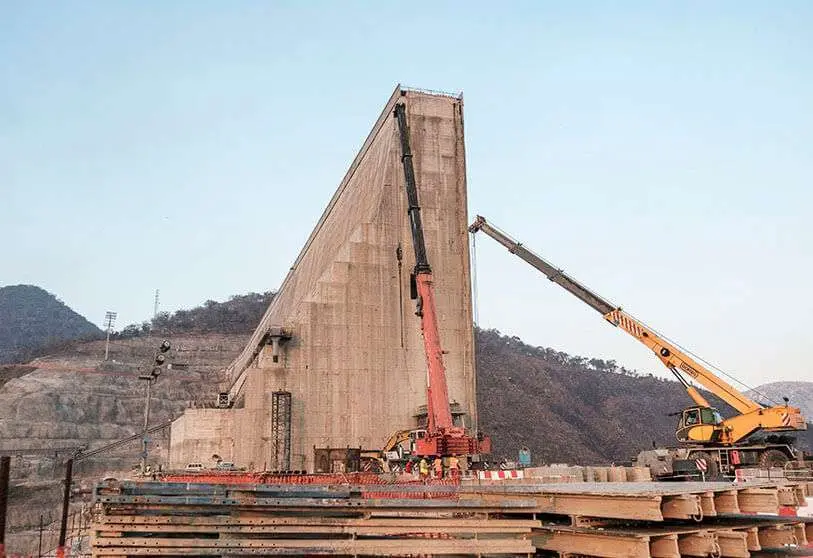The geopolitics of water that threatens Africa's stability

"Nowhere else in the world do absolute poverty and fabulous natural resources coexist so radically as in Africa. ...] The inability of the black continent to emerge from the deep pit in which it is plunged is aggravated by the absence, in most cases, of true democratic systems, of nationalist state sentiments and of a middle class that could provide stability to the ever-weak and unstable states". With these words, Colonel and analyst Pedro Baños began the article 'Africa: natural resources, wars and corruption', published on the occasion of the XVI International Defence Course in April 2019. More than ten years later, the geopolitics of water threatens the stability of the African continent. The three-way talks between Ethiopia, Egypt and Sudan on the dam being built by Addis Ababa on the Blue Nile have resumed over the last few days, although, for the moment, no agreement has been reached.

Egypt, which is almost entirely dependent on the Nile River for its fresh water, fears that the dam will reduce its water supply, and has therefore tabled a new proposal at the new round of talks taking place this week. Meanwhile, Ethiopia hopes to become Africa's largest energy exporter once the Great Dam is completed. Egyptian Water Minister Mohamed Abdel-Ati has said that "it is still too early" to know whether results will emerge from negotiations with Ethiopia on the contentious Great Dam of the Ethiopian Renaissance. In an interview with Channel One, he said: "We are negotiating until the last minute and in the end we will deal with the results of the negotiations. We want to reach an agreement to fill and operate".

The minister also stressed his country's absolute dependence on the Nile River. "We are completely dependent on the Nile River, as 95 percent of Egyptian land is desert," he said in a statement to the Egypt Independent newspaper. The ministers of water resources of the three nations involved (Egypt, Ethiopia and Sudan) began Friday a series of meetings to relaunch the negotiations on the Ethiopian dam. The talks are sponsored by the current president of the African Union and include the presence of observers from the United States, the European Union and representatives of the African Union, among others. The spokesman for this ministry also said that "the new Egyptian proposal is fair, integral and sustainable", and has the capacity to "achieve development in the three countries involved, as well as conserve water resources".
The hope of reaching an agreement before June 11 has not been lost. "As long as none of the parties violate the rights of the others, it is possible to sign this agreement," said the Water Resources Ministry spokesman. Meanwhile, Sudan on Monday presented a small roadmap covering the main milestones of the three-way negotiations on the Great Dam of the Renaissance and highlighted a number of controversial points that it believed could be overcome through negotiations, the newspaper Egypt Today reported.

Last June, Sudan's foreign ministry asked the UN Security Council to urge all parties involved in this dispute to "refrain from taking any unilateral measures that could affect regional and international peace and security". In the same request, they also asked the UN for support "to reach a comprehensive agreement capable of satisfying all parties".
The lack of understanding between the three countries led Egypt to present a new initiative on Sunday, in order to guarantee the Ethiopian goal of generating electricity while avoiding any damage to Egyptian and Sudanese interests, as established in the framework of the Declaration of Principles of 2015. During the negotiations, the Egyptian side has indicated that it "has not rejected any development project on the Nile River," as reported by Egypt Today. "Egypt supports the efforts of the Nile basin countries to meet the aspirations of their peoples," they stressed.

Egypt has also highlighted the importance of certain water resources to its country, saying that the Renaissance Dam is "existential" for its survival. In this sense, they have committed themselves to reaching a "fair and balanced" agreement that takes into account the interests of the three countries. However, in an opinion piece published in this same newspaper, Egypt defends the idea of seeking "procedures and options that preserve their historical rights over the waters of the Nile" and determine the alternatives available in case the two-week period passes without reaching an agreement. "There are two ways: the first is political and diplomatic, and the second is legal, without excluding the rest of the options, including military," they warn in this article. Ethiopia, for its part, insists on the economic benefit of this project to boost its economy, in a country where more than half the population has no access to electricity.

The governments of Egypt, Ethiopia and Sudan reached a principle agreement on the main points of dispute on Jan. 31. However, this agreement became a mirage after Addis Adeba decided to abandon it at the end of February. In this plan, the three parties involved had agreed on a timetable for filling the so-called Great Renaissance Dam through two mechanisms. Even so, the tripartite dispute between Ethiopia, Egypt and Sudan over the sharing of the waters of the Nile remains at a standstill, as the latest negotiations have shown. Meanwhile, Ethiopia is scheduled to begin filling the dam through the flow of the Blue Nile River, further increasing tension in the region amid an unprecedented health crisis caused by the COVID-19 pandemic.








